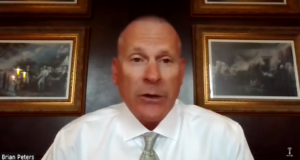
 The MHA received media coverage the week of Feb. 26 that includes quotes from MHA CEO Brian Peters appearing in stories by CNN and Crain’s.
The MHA received media coverage the week of Feb. 26 that includes quotes from MHA CEO Brian Peters appearing in stories by CNN and Crain’s.
CNN published an article Feb. 26 on the Michigan economy and aging population. Included in the story is a section on healthcare emerging as the state’s largest private sector employer. The section highlights how the aging population is leading to an increased need for healthcare services and references the 27,000 job openings in Michigan hospitals.
“Those folks who are headed off to their retirement days, they are the ones who demand more health care services,” said Peters.
Crain’s Detroit Business reported on the Change Healthcare cyberattack in a story published Feb. 29. The story looks at how market consolidation and the growing need for data sharing has led to higher cybersecurity risks for healthcare organizations. Peters mentions how healthcare is the top target for cybercriminals and explains the challenges faced by hospitals.
“These continued cybersecurity challenges stem from the complex and interconnected nature of hospital information technology systems, which often require integration with external software and hardware to support clinical operations, patient care and administrative functions,” said Peters. “Furthermore, hospitals must navigate a regulatory landscape that demands compliance with health information sharing, privacy and security laws, making the management of third-party risks a critical, yet challenging, aspect of their cybersecurity strategy.”
Crain’s Grand Rapids also published an article Feb. 26 on new state laws that increase the penalties for violence committed against healthcare workers or volunteers. The story looks at the increased rates of violence committed against healthcare workers and the issues it creates for workplace safety, recruitment and retention.
“It is flat out inappropriate to physically attack a healthcare employee and there are going to be consequences if and when it happens,” said Peters. “It’s a signal that we’re not going to tolerate this anymore.”
Members with any questions regarding media requests should contact John Karasinski at the MHA.






